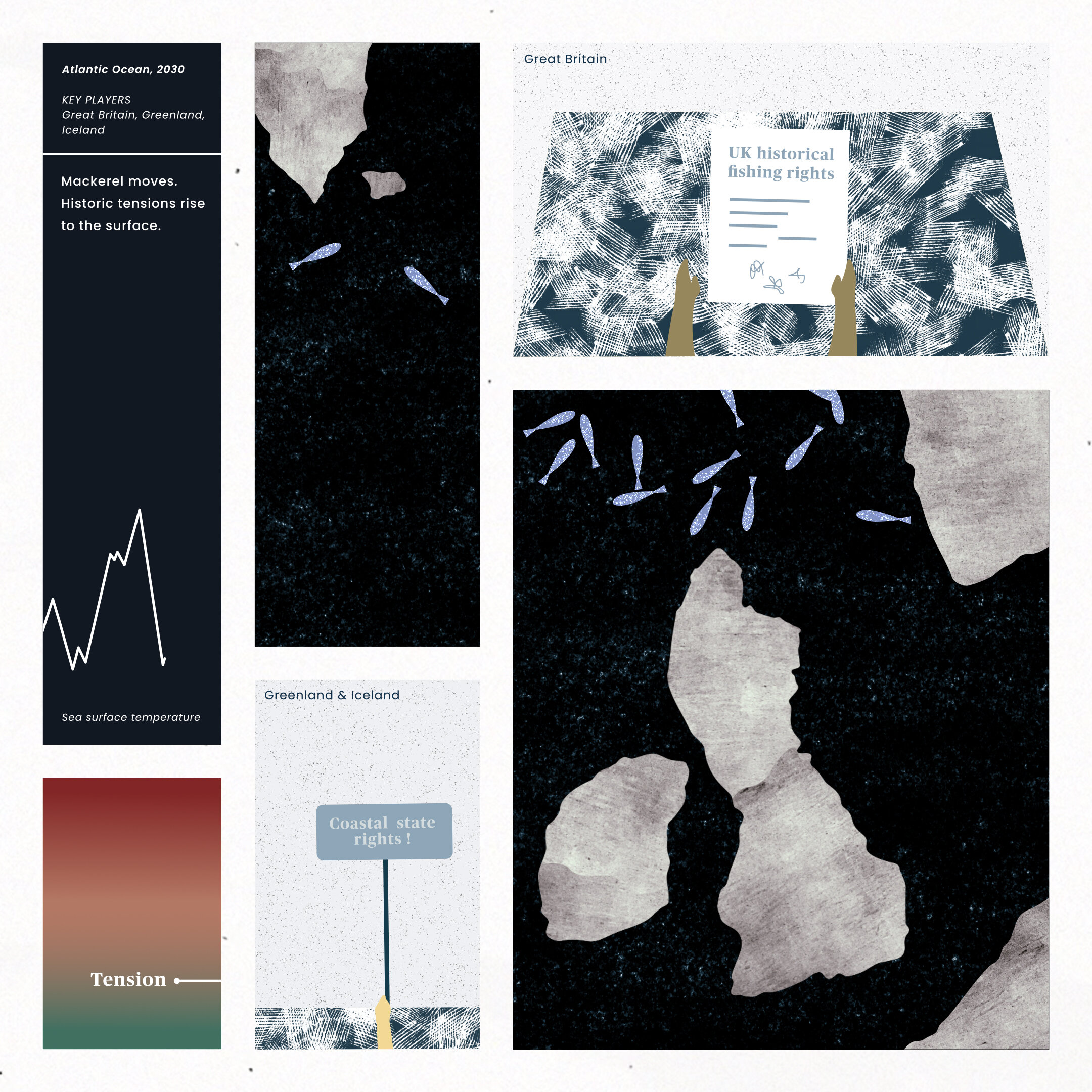Scramble for the Atlantic - North-East Atlantic Ocean (2030)
Our story begins sometime during the latter half of Earth's so-called twenty-first century. Most of humankind has been working diligently to ignore actually doing anything about the impacts of climactic change except when they can opportunistically take advantage of it. That worked for a while, until it didn’t. We deal with a period chiefly labeled as the post-truth era, a time marked by the use of non-knowledge and ignorance as important political forces, where facts are irrelevant and emotion and prejudice rule. With science unity out the door, the full consequences of this global experiment escaped nearly all governments and their people. Here is a recording of one such event that occurred at the onset of the period known as The Disintegration.
Great Britain: Good evening
The New Nordic Alliance (NNA): Good evening, we are all here. Can you hear us?
GB: Who is us?
NNA: All of us. The fisheries ministers of Iceland, Greenland, and the Faroese. We have business representatives of the New Nordic Alliance in the room, as well as two of our top scientists. Now. You wanted to once again discuss our fishing in the north-east Atlantic?
GB: Well, as we have previously made clear, Great Britain demands the right to exert the sovereign authority bequeathed to us under international law and to claim the marine resources that are rightfully ours.
NNA: You say Great Britain, but Scotland is eager to leave the UK, your biggest fishing industry, not least because they are fearful for the implications on their shellfish sales. Even Northern Ireland and Wales are ready to jump ship. Hardly ‘Great Britain.’
GB: Please do not resort to disparagement and ill-formed suppositions. It is our right to claim the resources that are lawfully ours, and support the rebuilding of our fishing industry.
NNA: Listen. You don’t have any fish, they moved North, they are ours now and we have processed most of them already. Our negotiators have been over this countless times, perhaps you should have invested time and money in building vessels and processing facilities for anchovies, our scientists say they’re coming in to your waters next.
GB: Forgive us, but that is simply not true. Our scientists, respectable people that do excellent research, tell us they are not all gone from our territory. Our Navy vessels even saw you entering our waters, targeting our fish!
NNA: It is impossible for us to confirm or deny that accusation. Navigation malfunctions of course happen, and that cannot be helped. Why did you not take the opportunity to apprehend the vessel, if you felt it was violating your sovereignty?
GB: Well… We petitioned the European Union for assistance, but they refused to intervene to assist us in enforcing our fishing regulations. This was clearly a retaliatory tactic for the British people deciding to re-establish their sovereign authority. This was most especially the case as we were, regrettably, forced to ban them from our waters after we expelled their fleet… This seemed to have particularly provoked Holland and Belgium who then petitioned the European Commission, supported by France and Denmark to refrain from supporting us in our hour of need.
NNA: Don’t be disingenuous. Great Britain left the union without having a fishing agreement in place, and of course Norway is too politically aligned with the EU to discuss any agreement without the EU. You must remember our altercation with regards to EU accession? At the very least, you could have taken a hard look at the numbers – your people don’t even want to eat the fish you worked so hard to reclaim. Horse mackerel and chips? Please. You just forced yourself into a situation where buying the fish your people actually want to eat has become much more expensive. Forgive me for my flippancy but in Iceland we have a saying; ‘If you can’t take the heat, don’t swim in a volcanic lake.’
GB: This is a blatant violation of our rights as a fishing nation!
NNA: These fish are in our waters and have been for many years now. Even the North East Atlantic Fisheries Committee admitted it was utterly powerless once fish began swimming all over the North. Essentially, the United Nations Fish Stocks Agreement is no longer applicable. It is archaic, not suited to such a volatile ocean. Besides, we ourselves are struggling to exploit the fisheries resources in our waters. We are sparring with the Russians and the Norwegians. We had to spend a good chunk of our annual GDP to weaponize our fishing fleet, to act as a deterrent and now with our surveillance drones and EMP torpedoes, we can finally secure our stock
GB: (Outraged) This is not a matter of our honor and some misguided quest to reclaim ancient lost glory, it is a matter of rights. We do not need the European Union or anyone else for that matter to protect what is rightfully ours. Historical catches are a key factor in determining fishing quotas, and we have always caught mackerel and herring. The United Nations Fish Stocks Agreement clearly states that historical rights matter and that even if the fish shifts its distribution, our right to harvest our fairly allocated and agreed quotas remains in effect. What’s more, we are allowed access to your surplus stocks! This is a blatant violation of our rights under international law.
NNA: We just explained, the fish stocks agreement is functionally void now. You think historical catches, zonal attachment or any other one of those ridiculous metrics we used to adhere to still make sense in this changed environment? The world has changed.
There are no Coastal State agreements anymore, we have even halted our scientific collaborations. Maybe you would have a leg to stand on if you were part of the European fishing fleet still. Perhaps you should have considered a suite of alternative options for supporting your economy before you decided to abruptly exit. Perhaps, a more effective strategy would be to wait until anchovy moves even further north. Besides, if there was mackerel or herring left in your waters, you would not be pleading us to give you access to take a share of ours.
GB: There is most assuredly a significant stock of mackerel remaining, despite your rampant overfishing, despite your unwillingness to negotiate a fair and just total catch! Our scientists recently revised their stock assessment after some early errors and estimated a substantial abundance, for many years to come. Please admit that you are unwilling to negotiate a fair and equitable sharing and access agreement because you are focused on taking advantage of the ecological windfall resulting from climatic shifts. We know that a large part of the stock might have moved north, but our scientists tell us the stock is healthy. There should be enough for us to craft a sharing agreement for the benefit of all parties. This will require, of course, sustainable management from the NNA group, and not this reckless jeapardization of the stocks!
NNA: Egg surveys, trawl surveys, none of the established scientific stock assessment methodologies turned out to be very reliable anymore, which is exactly why we exited the scientific collaborations. You are quite correct that years ago, we thought the stock was very abundant and breeding fast, so we fished hard. The Norwegians, the Europeans, even the Russians. We together learned something to our detriment, it turns out that a chaotic free-for-all is not the best way to manage unpredictable fish stocks… And you need to acknowledge your own wrongdoings in this. We, Iceland and Greenland, we did everything we could to support responsible, precautionary management. We tried for years to get a fair management plan! You were unwilling to cooperate at the time so, yes, we were catching hundreds of thousands of tons. Now… now a few tons at best. And I am sorry to say, those tons are all in our Exclusive Economic Zone, the stock shift is real.
GB: Are you calling our scientists liars, our research invalid? New Nordic Alliance, this is absolutely a despicable way of negotiating! If we do not come to a reasonable agreement here, we will be left with no option but to take this to the courts.
NNA: We ask you again to please acknowledge your own role in this dispute. You should not have promised your fishing industry a return to the glory days. Projections many years ago showed stocks leaving your waters and moving north. Maybe you should have taken climate change a bit more seriously when you had the chance. Look, it’s tough, even on us. We are lucky we have our geothermal energy surplus and our digital services, otherwise we could be worse off than you.
GB: We will not leave it at this! We will take you to court!
NNA: Under which jurisdiction precisely do you propose to take this case?
GB: We are a legitimate Coastal State now. You must consider-
NNA: We will hear from you (disconnect tone)
alternative pathway(s)
Great Britain’s economy crashes following Brexit, prompting its citizens to overwhelmingly vote to rejoin the EU. After several years, the EU allows them to rejoin as a member state and the UK then collaborates with the other EU states as well as Iceland and Norway to modernize the management of the stocks in the North-East Atlantic, making their strategies resilient to climatic changes.
Brexit proves to be a success for Great Britain, and it manages to negotiate with other Coastal States for extra stock quotas based on the principle of zonal attachment. Strict controls on fishing by foreign vessels are implemented in its EEZ, best practices in fisheries management are adopted and considerable investments are made in technological advancements (e.g. sophisticated ecosystem models that optimize harvest strategies). These measures result in a more sustainable fishery, without conflict with neighboring states.
Great Britain fails to negotiate extra stock quotas after Brexit, and due to the loss of the EU as its main export market, the profitability of its fisheries greatly declines. As a result, Great Britain turns to various warm water species that have become more abundant due to climate change. These stocks become part of lucrative catch-and-release recreational fisheries. Inshore fishing grounds are largely protected as nursery grounds for those species, to increase biodiversity, to act as natural carbon stores and to protect coasts. Only a few large commercial offshore fishing vessels remain, mainly targeting pelagic species. Other Coastal States start to look at this new approach with increasing interest




